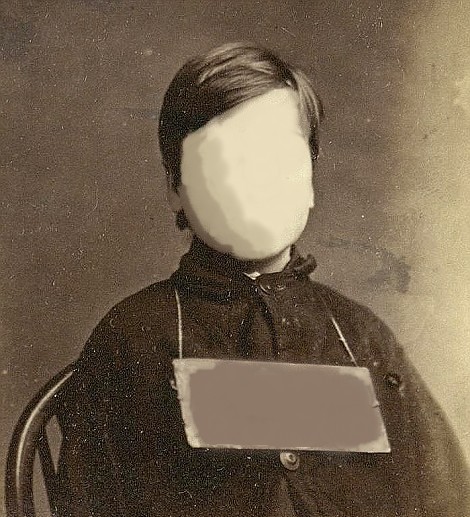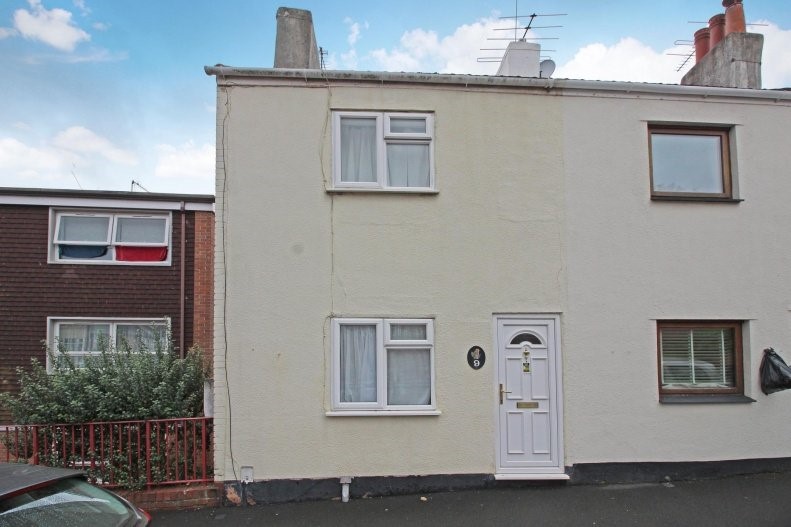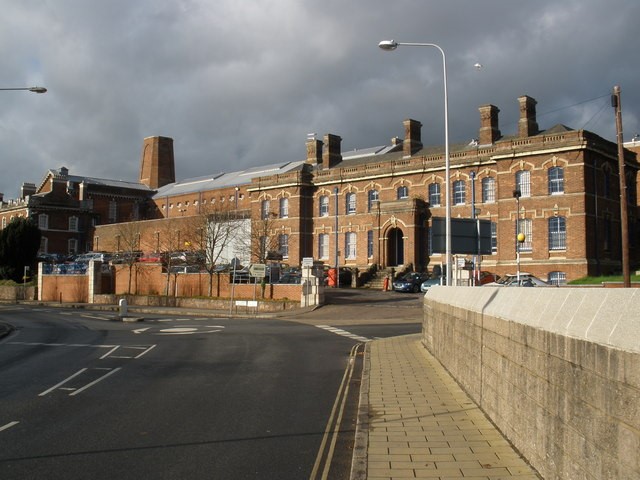
“The duck was much prized Mr. Moseley, who said he did not think it could be matched in the city.”
Not every crime is heinous, nor every act abhorrent. Some are crimes of necessity, a need to feed a family amidst the privation and starvation of poor town life. Add to this a fear of workhouses, places renowned for physical and mental hardship, and you create a dangerous melting pot ready to explode. Enoch Hall was one such man who took the law, and other peoples goods, into his own hands.
Early Life
Son of Thomas and Elizabeth Hall, Enoch Leat Hall was born sometime in 1827 and then baptised later that year on the 5th June 1827, in Ross Herefordshire[1]. He does not appear again in the historical record for some years and, even in the 1841 census, whilst we see his father Henry, working as a mason, and mother Elizabeth living with his sister Emma, aged 15, in Mary St Clyst, the 14-year-old Enoch is conspicuously absent[2]. It is possible that he has been apprenticed off or working as a servant, but we have found no definite leads in this regard. Indeed, the next mention of him is not until July 1847, when he marries Sarah Ann More; they have their first daughter Jessie within two years[3].
Life for a while at least carried on swimmingly, that is until Enoch was arrested for his first felony and was thrown in the doghouse.
The Crime
On the 21st November 1849 Enoch Hall, now working as a labourer in Heavitree, stole the collar and halter of a dog. He was seen to do this by the dog’s owner, Charles Brutton, and was promptly arrested by Inspector Stuckes of the City of Exeter police[4]. The evidence was heard, the witness questioned and Enoch was committed to trial on New Year’s Eve of that same year. He was found guilty at the City of Exeter Quarter Sessions and sentenced to six weeks in prison: the short tenure of sentence due to his having no previous convictions[5].
On release, Enoch settled down for a time. In or around 1850, Enoch welcomed into the world his first son, William Hall, and money was tight. We see this in the 1851 census where Enoch, now 24 and still labouring, is living at 9 Glodsmiths Place, Heavitree with his wife Sarah Ann Hall, 30, daughter Jessie Hall,4, his new-born son William Hall,1, and a 56 year old lodger, Michael Davy, all under one roof[6].

Greater strain was further placed on the Hall’s purse strings when William was followed in successive years by three other siblings: Thomas, James, and Sarah Ann. For a casual labourer in and out of work, with a large family to provide for, there were very few means with which to stretch his shillings. On the 30th September 1855, Enoch Hall made the wrong choice.
The Crime 2
“That wrong choice happened to be the prized duck of Mr George Isaac Moseley, local gardener and poultry breeder extraordinaire. Taken from the Western Times published on the 20th October 1855, the crime was as follows:
It appeared from the evidence of Elizabeth Hoggets and Richard Lang, and other witnesses, that the prisoners [Enoch Hall and George Harris] were seen near Mr. Moseley’s house on the morning of the 30th September, about half-past one. Some time after the prisoners had passed, the drake was missed. The prosecutor and Lang then went to the prisoner Hall’s house, at Heavitree. On Lang’s looking into Hall’s door, he saw Hall with a “mallard “on his lap, and a knife to the throat it. Hall then said—”Forgive me.” Harris was also the same room. Shortly afterwards, Moseley went towards the garden behind Lang then asked Harris to assist him to take Hall in custody ; but as soon as he knew that Woodbury, the constable, was sent for, he jumped over the wall, and decamped. The constable and Lang then attempted to take Hall into custody; on this, Hall attempted to stab both of them with a knife, and knocked the constable down, and cut him in the hand.”[7]
The evidence was clear and the case was taken to trial. On the 15th October 1855, after spending 10 days in Exeter Gaol, Enoch stood before the court and addressed them. In his speech he tried to debunk the prosecutor’s assertion that an ‘owner’s mark’ under the wing proved the bird was in fact Mr Moseley’s.
“The prisoner Hall now made a long speech in his defence, saying that the prosecutor never said he had any mark on the bird before the magistrates; and that it was utterly impossible that ink would stand, the feathers of a duck being of a very greasy nature.”[8]
Enoch was clearly guilty having had the bird in his possession, despite his protestations that it was a different bird, and the only matter that remained was whether or not Harris was complicit and if so, how much should each man be sentenced for.
“The learned Recorder summed up, remarking that there was no doubt that Hall was seen with the duck, and with a knife in his hand. With reference to Harris there was positive evidence that he knew anything about the duck but the question was, whether Harris was there upon the occasion referred to for the purpose of assisting Hall to steal the Duck. The Jury, after considerable deliberation, stated they could not agree in their verdict, and they were locked up.”[9]
It took the jury a number of hours to return from discussion and even then, they could not reach a quorum on Harris.
“The Foreman stated they were agreed as to one of them; and that the doubt was in reference to the prisoner Harris. The Recorder explained that if there was any doubt in their minds as to Harris’s guilt, they must give the prisoner the benefit of that doubt. A Juryman—There is no chance of our agreeing “at present!” The Recorder—Perhaps you are not aware that I can keep you here all night, without anything to eat —that is answer to the gentleman who says there is no chance agreeing •* at present!” The Jury again deliberated for some time, when they returned a verdict of guilty against Enoch Hall, and not guilty against George Harris. The prisoner Hall had been previously convicted, and the Recorder sentenced him to four years’ penal servitude. This concluded the business; and the court rose at halfpast three o’clock.”[10]
Enoch Hall was once more put in prison.

Imprisonment
From Exeter Gaol, he was transferred to Millbank on the 21st January 1856. These first few months in prison would have been in solitude, the separation system was in place here, but did not seem to diminish his spirit or antagonize his being. Prisoner 2067, as he was designated, had ‘good’ behaviour and was listed as a protestant with imperfect reading and writing.
From Millbank to Pentonville on the 15th July 1856, now prisoner 6417, where his behaviour is once again uniformly good. One curiosity to note is that his listed next of kin is not his wife, but rather his mother who still dwelt in the same village of his birth, Mary St Clyst.
In Portland Prison from the 15th September 1856, now prisoner 6603, he really shone. Each quarterly return saw his behaviour dip no lower than ‘Very Good’ and was, on most occasions, ‘Exemplary’. The last part of his sentence saw him transferred to Woking Prison, a place where his skills as a labourer would find him in good stead. The prison needed workmen with generally good behaviour, to finish building the structure in a timely and cost effective manner. On the completion of the building, Enoch’s sentence expired.
The fresh complexioned, blue eyed, 5’6 tall Enoch Hall was released on the 10th August 1859.
Aftermath
Not long after his release, sometime in 1860, Enoch became a father again, this time to Albert Hall. This birth proved to be a pivotal point in Enoch’s life and he was never again seen within the shadows of a penitentiary wall. Instead, the deficit in income and outcome were met through taking on more lodgers and his family taking on work.
In 1861[11], Enoch Hall aged 32 was now working as a Land grower (agricultural labour) and his wife Sarah Ann Hall, now 41, was a laundress: the lived on Quarry Lane in Heavitree, a place where his former indiscretions had taken place and were locally known. In an effort to keep the family in pocket and food, William Hall, aged 11, was working as a labourer to help feed his young siblings, Thomas, James, Sarah and baby Albert, aged 7 months.
20 years later Enoch and his wife Sarah Ann, having watched all their children fly the nest, settled at 5 Court Cottage, Heavitree. But peace was not their lot in life and even in this, their twilight years, they were forced to let out empty rooms to Thomas Melhuish, a 55 year old labourer and William Fly, an 83 year old invalid living on parish alms[12].
Enoch died 6 years later and was buried in Heavitree.
[1] ‘Baptism Record’ (Baptism Record, 2020) <https://search.ancestry.com/cgi-bin/sse.dll?indiv=1&dbid=9841&h=68076897&tid=&pid=&usePUB=true&_phsrc=fGM43&_phstart=successSource> accessed 18 March 2020.
[2] ‘1841 Census’ (Ancestry, 2020) <https://www.ancestry.com/interactive/8978/DEVHO107_204_206-0616?pid=1051185&backurl=https://search.ancestry.com/cgi-bin/sse.dll?indiv%3D1%26dbid%3D8978%26h%3D1051185%26tid%3D%26pid%3D%26usePUB%3Dtrue%26_phsrc%3DfGM79%26_phstart%3DsuccessSource&treeid=&personid=&hintid=&usePUB=true&_phsrc=fGM79&_phstart=successSource&usePUBJs=true&_ga=2.205173462.779704563.1584126411-769016470.1583454426> accessed 18 March 2020.
[3] ‘Marriage Record’ (Ancestry, 2020) <https://www.ancestry.com/mediaui-viewer/tree/32317606/person/29795957397/media/4af584ab-e8d9-4dc3-bdcd-2f1e1f70ff7d> accessed 18 March 2020.
[4] ‘Exeter Police November – December 1849, Devon’ (Genuki, 2020) <https://www.genuki.org.uk/big/eng/DEV/Exeter/Police2/ChargeBook1849-6> accessed 18 March 2020.
[5] ‘General Quarter Sessions At Exeter’ (Findmypast, 2020) <https://search.findmypast.co.uk/record?id=TNA%2FCCC%2FHO27%2F091%2F00194&parentid=TNA%2FCCC%2FHO27%2F01503095> accessed 18 March 2020.
[6] ‘1851 Census’ (Ancestry, 2020) <https://www.ancestry.com/interactive/8860/DEVHO107_1866_1867-0088?pid=5680288&backurl=https://search.ancestry.com/cgi-bin/sse.dll?indiv%3D1%26dbid%3D8860%26h%3D5680288%26tid%3D%26pid%3D%26usePUB%3Dtrue%26_phsrc%3DfGM43%26_phstart%3DsuccessSource&treeid=&personid=&hintid=&usePUB=true&_phsrc=fGM43&_phstart=successSource&usePUBJs=true&_ga=2.208990676.779704563.1584126411-769016470.1583454426> accessed 18 March 2020.
[7] ‘Western Times’ (Britishnewspaperarchive, 1855) <https://www.britishnewspaperarchive.co.uk/viewer/bl/0000265/18551020/044/0009> accessed 18 March 2020.
[8] Ibid.
[9] Ibid.
[10] Ibid.
[11] ‘1861 Census’ (Ancestry, 2020) <https://search.ancestry.com/cgi-bin/sse.dll?indiv=1&dbid=8767&h=17622702&tid=&pid=&usePUB=true&_phsrc=fGM43&_phstart=successSource> accessed 18 March 2020.
[12] ‘1871 Census’ (Ancestry, 2020) <https://www.ancestry.com/interactive/7572/DEVRG11_2143_2148-0105?pid=3061891&backurl=https://search.ancestry.com/cgi-bin/sse.dll?indiv%3D1%26dbid%3D7572%26h%3D3061891%26tid%3D%26pid%3D%26usePUB%3Dtrue%26_phsrc%3DfGM43%26_phstart%3DsuccessSource&treeid=&personid=&hintid=&usePUB=true&_phsrc=fGM43&_phstart=successSource&usePUBJs=true&_ga=2.190634349.779704563.1584126411-769016470.1583454426> accessed 18 March 2020.